Features
Peter Litwin of Coffin Break: The Daily Vault Interview
by Pete Crigler
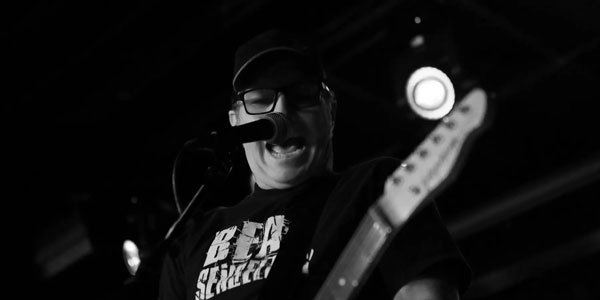
Coffin Break is a Seattle-based punk band formed in the mid-’80s by guitarist/vocalist Peter Litwin, bassist/vocalist Rob Skinner and drummer Dave Brooks. Recording for local C/Z Records, the band left quite an impression with its sound, a combination of vocal harmonies and abrasive music. The band left C/Z and signed with Epitaph in the early ’90s for two more records before disbanding around 1994.
Subsequently, the band began playing shows again in the mid-’00s before returning to the recording studio for 2025’s Revival, made up of re-recordings of classic songs plus one new track. I reached out to Litwin to talk about the band’s career, new record and legacy. He could not have been more gracious; enjoy!
THE DAILY VAULT: When did you get interested in music?
PETER LITWIN: For me, it was about 5th grade, I bought a Monkees record & then a bunch of Beatles records. Things changed, though, when I first heard Black Sabbath’s Master of Reality about a year later.
How did the band come together and what was the scene like in the late ’80s?
I was playing with a couple of guys and the bass player quit, so we put an ad in the local music magazine—The Rocket. That is how we found Rob. Later on, our drummer didn’t really want to tour, so we replaced Steve Corliss with Dave who was playing across the hall (at the Music Bank) with Cat Butt.
The scene in the late ’80s was kind of weird because there weren't a lot of all ages shows because they had this Teen Dance Hall ordinance that outlawed all ages gigs. So, we ended up playing a lot of shows out of town, since we preferred playing all ages shows. I actually put on a bunch of shows over in Bremerton at Natachas, an hour ferry ride away from Seattle. Those shows were by the seat of my pants. I was always a little scared I was gonna lose my ass. I would just show up with like 50 bucks in singles and hope I had enough to pay for the hall, for sound, and to pay all the bands. It always seemed to work out.
So mostly in town, we played in bars. Rob could only come inside during our set because he was only 20 at the time. But the shows themselves were actually pretty good. It seemed like most of the audience were other musicians and it seemed like most of the bands were very supportive of one another, which we really appreciated. The scene wasn’t very big back then, maybe a few hundred people, but it was strong.
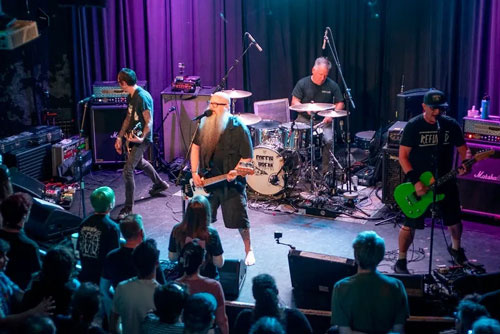 When did the band sign with C/Z and record Psychosis?
When did the band sign with C/Z and record Psychosis?
Around 1989.
What was the songwriting like?
Rob or I would usually come in with a riff and some lyrics and we would kinda build the songs from there. Sometimes we just made up a riff on the spot and then built a song that way.
Do you feel the band hit their peak with Rupture?
No, I don’t. I know some people think that might have been our best record, but I really thought Crawl & Thirteen were really good too. There are definitely some songs on those two records I don’t like, but overall, I like most of them. I also think it can depend on what record you heard first. Some people that only got exposed to us when we were on Epitaph think Crawl or Thirteen are the best ones. I also think the new record, Revival, sounds really good. Although there’s only one new song on it, the sounds are better. The technology is so much better now and we all have a lot more years playing under our belts.
What was the impetus for signing with Epitaph?
C/Z didn’t really provide much tour support or really much support at all besides putting out the records. We paid for all the recordings and then C/Z put them out, which we greatly appreciated. We didn’t have a clue how to do that & C/Z had distribution (which was very crucial). C/Z believed in us from the beginning.
But Epitaph was able to provide tour support and get us over to Europe. And they had the money to actually do a lot of ads and make promo posters, etc. It was just a lot bigger of an operation than C/Z was. Plus we got to be on a label with Bad Religion, my favorite band at the time. That was like a dream come true, and then we got to do a couple of tours with them. It was pretty damn cool. They were really nice to us.
How was the recording of Crawl and Thirteen?
They were quite different actually. I mean both were with Jack Endino, so that part was the same. But when we recorded Crawl, we didn’t know what label it would come out on. When we recorded Thirteen we knew it would be on Epitaph. Because they had more resources, we actually had the time to spend a couple weeks in the studio recording, which was very nice and a bit more relaxed.
How did “For Beth” come into existence?
Rob wrote that song about Dave's girlfriend after they spilt up. They all lived in the same building together. That is actually my favorite Coffin Break song.
What did Jeff (Lorien, deceased former guitarist) bring to the band?
Jeff was a friend of mine and a great guitar player, so he added a really nice element to the band. His solo on “Hole In The Sky” is pretty spectacular if you ask me. The other nice thing for me, was Jeff was sober. It was nice to have another guy in recovery when we were on tour. And now Todd brings that great guitar work to the band, he is also a really nice guy and very motivated. He breathes energy into the band.
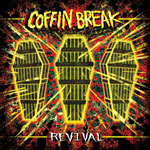
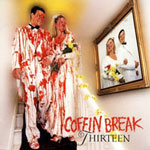
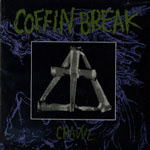
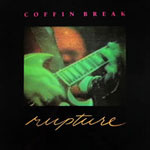
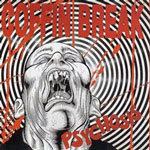
What caused the band to split?
We just got off another long tour and I think we were ready to be done and try other things.
Did it feel strange seeing Seattle blow up afterwards?
Yeah of course, we kind of broke up right at the wrong time. I mean Epitaph blew up right then too. The Offspring opened for us at the Whiskey about six months before they went on to sell 10 million records. I loved them which is why I asked them to play that Whiskey show.
When did the band come back together and start playing shows?
In 2007 someone put on a show called Geezer Fest. It was all these old Seattle bands – us, Swallow, Love Battery, RC5, Blood Circus, and like 20 other bands. We got back together for that one show. And then every so often someone would ask us to do a show and we would. We kinda went on like that for quite a while, just playing every few years.
Tell us about Revival; what did you set out to achieve with this record?
Initially we were just going to get some sounds, record a few songs and then it just kept growing and we ended up recording 24 songs. Rob engineered it all in Dave’s garage. And then from there we asked Jack Endino to mix it and thought it sounded really good. Initially, it was going to be on Sudden Death (Joey from DOA’s label), but then it made more sense to put it out ourselves, so we did on our own brand-new label—Broken Vinyl Records.
What’s next for the band; is there a further chance of recording?
We’ve been playing a bunch of shows in support of Revival, and those have been going really, really well. We’re doing some upcoming shows all around the Northwest and then see what happens from there. Next year, we plan to write a new record.
What do you hope the band’s ultimate legacy will be?
You know, we’ve been seeing lots of young kids at our shows and I’ve been really enjoying that. There was a bunch of young kids at a recent show, a local festival called Bumbershoot. Anyway, at the show it looked like they were having a lot of fun getting into our stuff. So hopefully we can influence some kids into playing music themselves someday.